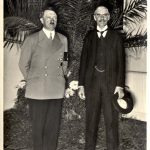Burgundy was an important former duchy in south-central France, originally settled by a German tribe called the Burgundii, there in the 5th century. It was first under Merovingian control, and later was absorbed into the Carolingian Empire (q.v.). While powerful Holy Roman Emperors exercised imperial control it was ruled by a series of impressive dukes.
Oddly enough, the Court of Burgundy was by far the most splendid in Europe, but few people have heard of it, France having easily and erroneously assumed that mantle. Dukes of Burgundy were more powerful than kings of France, especially when they were astute enough to form partnerships with England (as they did during the Hundred Years War). It was then that these dukes presented a real threat to the kings of France.
Charles ‘the Bold’ was arguably the greatest of the Burgundian dukes. He was born in 1433 and was Duke of Burgundy for ten years from 1467. He near as nicket managed to create a ‘kingdom’ out of his dukedom, totally independent of the throne of France. He attempted to persuade the Holy Roman Emperor (q.v.) to grant him the title of King in 1473.
Charles supported ‘The People’ against Louis XI, and after 1467 made successful sorties into the Rhineland and Alsace, with an eager eye on expansion. After 1475, however, he made the mistake of fighting against the Swiss, and was defeated in battle and killed. The realm he had created was absorbed by the French monarchy and Maximilian I, King of the Romans. But, one hundred years before his birth, a former duke of Burgundy was also called ‘Bold’ . . .
Philip ‘the Bold’ was born in 1342, the fourth son of ‘John the Good’, king of France. He was made Duke of Burgundy in 1363 when he was twenty-one years old. Six years later he married Margaret, heiress and daughter of the Count of Flanders. In those times, and for some considerable time afterwards, brothers of French kings were automatically made dukes of Orléans or Burgundy.
In 1380 he assisted the Count when the Flemish lower-middle classes and the merchant class revolted against the latter. They were cruelly put down, in massacres in which some 26,000 Flemings died.
When the Count died in 1384 Philip found he had inherited Flanders. He took this as a good omen and career move, and started a firm patronage of both business and the arts. During the childhood of Charles VI Philip became in effect the ruler of France. Unfortunately this king went mad in 1392, and Philip had to fight for power against Louis d’Orléans, the king’s brother. The conflict continued even after Philip’s death, under the leadership of his son, yet another well-described individual called John ‘the Fearless’.
Philip ‘the Good’ was born in 1396, and became Duke of Burgundy in 1419. Among his first moves on the diplomatic chess board was to form an alliance with the ambitious and rather violent Henry V of England. He did this by signing the Treaty of Troyes, in which Queen Isabella of France named Henry as successor to the French throne. Here is the reason, oh studious ones, why kings of England called themselves ‘King of France’ for so many succeeding centuries.
Philip became a powerful ally of England in the opening decades of the 15th century. His territories included Namus (acquired in 1421), Holland, and Zeeland (1428). Brabant was his too, and Luxembourg, and the bishoprics of Liége, Cambrai and Utrecht came under Burgundian control. He acquired this mini-empire by inheritance, marriage, purchase or victory in battle. Combined, they gave him what was in effect a ‘state within a State’.
More was to come; in 1435 the Treaty of Arras relieved Philip of doing homage to the French king, and he became almost independent of any royal control. But then the French king managed to break the alliance between France and England: from 1436 Burgundy joined France in the battle against England.
When Philip imposed taxation on the Burgundians he opened a hornets’ nest. They revolted, but were savagely put down (approximately 20,000 died) in 1454. Nevertheless, Philip’s court became what historians describe as ‘the most prosperous and civilized in Europe’. He founded the chivalric Order of the Golden Fleece, and was an enthusiastic patron of the arts, especially Flemish painters.
Share the post "Charles ‘the Bold’, Philip ‘the Good’ & Philip ‘the Bold’ (of Burgundy)"









Leave A Comment